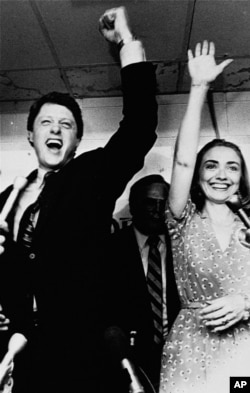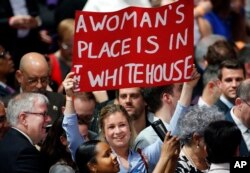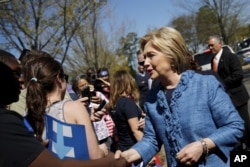The reporter in the Clintons' crosshairs 20 years ago remembers the new Democratic presidential nominee as a "formidable figure."
Michael Isikoff was the first journalist to discover the affair between President Bill Clinton and intern Monica Lewinsky. He remembers better than anyone how fiercely Hillary Clinton fought for her husband and the fate of his presidency as the White House battled Isikoff and the rest of the news media.
"She's smart. She's tenacious. She doesn't give up," Isikoff said. "She's a political combatant but you know beneath that sometimes friendly, benign demeanor, there's one strong political competitor."
Clinton is an unlikely nominee in an election cycle marked by populist sentiment and a desire for authenticity. The battles that made her a formidable political personality will also create significant challenges as she moves on to the next step of facing presumptive Republican presidential nominee Donald Trump in her effort to become the first female president of the United States.
Clinton's public image has undergone as many changes as her titles, from wife of the governor of Arkansas to first lady of the United States, U.S. Senator and Secretary of State. The barriers of public life have often prevented her from showing her personality.
Cool, calm, calculating
"She was cool — and I mean that in the right sense. She was calm; she was calculating," said Ron Fournier, a journalist who has known Clinton since the 1980s.
Fournier recalls witnessing a turning point in Bill Clinton's career in Arkansas that could inform the battle to come in November. He watched Hillary Clinton interrupt a news conference to defend her husband against his Democratic primary challenger for the governorship, completely ruining the opponent's chances in a matter of moments.
Fournier says that if she wants to be seen as a transformative 21st-century leader, "to be a lot better than Donald Trump and blow him away and not just barely beat him or not lose to him, you have got to be more like that scrappy, transparent, funny, vulnerable person that you were in Arkansas."
Clinton herself has acknowledged that she is not a natural politician like her husband and, in a 2008 debate, then-presidential candidate Barack Obama told primary opponent Clinton that she was "likable enough." The two went on to have a good working relationship as president and Secretary of State, but Obama's comment summed up a general feeling that has plagued Clinton for years yet is not entirely true, says Fournier.
Fournier says he used to bump into Clinton and her husband in the park and grocery stores in the small town of Little Rock, Arkansas, and enjoyed chatting with her while in the press corps on her trips as first lady.
"She's got a very engaging sense of humor," Fournier said. "She's very good at being funny in the moment. That self-deprecating humor. That laugh that drives a lot of people crazy, I actually find very engaging because it's very authentic, earthy, it's very contagious in person."
Fournier says Clinton has changed a great deal since that time. From negative, sexist attacks on her keeping her maiden name after marriage and her education and health care reform initiatives in the 1980s and ‘90s to the revelation of her husband's infidelities, he says Clinton "built up a lot of scar tissue."
Distrust of news media
Clinton faces significant questions about her credibility and authenticity headed into a general election battle with Trump, and she risks recalling the battles of the 1990s as she approaches those problems.
"This was all one big battle for the Clintons, and you know the goal was to smash the accusers and beat back the press," Isikoff said of Clinton's time as first lady. "So I think a lot of Hillary Clinton's views on the press were shaped during that very critical period."
Even now, Clinton's suspicion of the news media extends into her campaign. She favors the more controlled atmosphere of TV interviews over news conferences, where reporters can ask a range of questions. In a battle that recalls the current controversy over her private email server as secretary of state, Clinton fought as first lady to prevent the release of records relating to the Whitewater investigation.
"There were people inside the White House who were urging very strongly the Clintons to do that and Hillary Clinton said no," Isikoff recalled. "She was the one who pushed back and said, 'No, we don't want to give them anything. If we give them any material, they'll just use it against us.'"
Fournier says Clinton operates as if it is still the 1990s, when problems could be spun or explained away.
"You can tell people that you did it out of convenience, even though that's not why you did it. And it wouldn't matter, we could fake our way through it, we could get our base to buy it and just push it through."
Nudge from Bernie
But the 2016 primary season challenge from Vermont senator Bernie Sanders may have pushed Clinton to become a better candidate by forcing her to address issues like her speaking engagements before Wall Street groups.
"Why would you give the appearance that you are in the pocket or cozy with Wall Street or some of the other special interest groups she spoke to?" Isikoff said. "Why would you do that when you know you are going to be running for president?"
Even if Clinton can overcome personal hurdles, American voters will ultimately be the ones deciding if the figure they have known in the country's political consciousness for the past three decades should have an opportunity to hold the top spot for four — or even eight — more years.
"She's a figure from another era and elections tend to be about the future, tend to be about who is going to change things, shake them up and make them different," Isikoff said. "It's very hard for people to see Hillary Clinton — somebody who has been around for so long — in that light."








